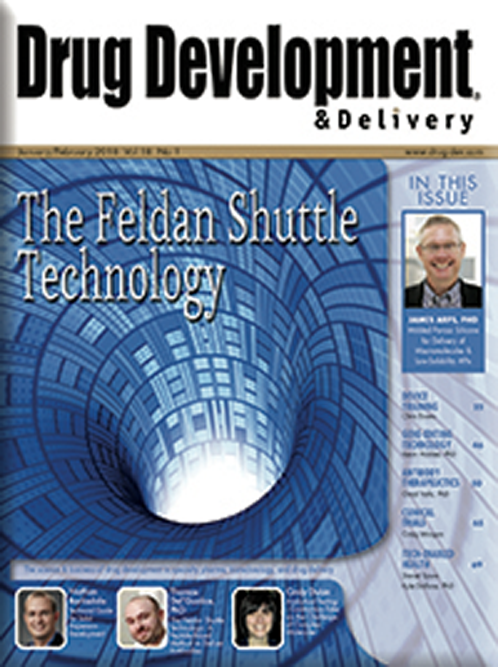issues
January/February 2018
Download PDFCOVER
INTRABODY DELIVERY - The Feldan Shuttle Technology: A Peptide-Based Method to Deliver Antibodies
Thomas Del’Guidice, PhD, Nancy Messier, PhD, and David Guay, PhD, present the Feldan Shuttle technology, a peptide-based delivery method that could provide efficient and safe intrabody delivery in mammalian cells.
FEATURES
PARTICLE DESIGN TECHNOLOGY - Technical Guide for Solid Dispersion Development
Nathan Barksdale and Elizabeth Hickman, MBA, say there are many articles on the theory and scientific principles underpinning the benefits of ASD, and introduce the reader to the steps involved in the development and manufacturing of an ASD via the spray drying process.
DEVICE TRAINING - Maximizing Patient Adherence by Minimizing the Forgetting Curve
Chris Evans explains how it is important that pharmaceutical companies and their drug delivery system partners proactively address the forgetting curve by rethinking how patients learn to use self-administration systems.
SPECIAL FEATURE - Analytical Testing - Contractors Take on the Challenge of Complex Molecules
Contributor Cindy H. Dubin highlights some of the analytical testing services that leading contractors offer aimed at the increasing complexities of today's pharmaceutical pipelines.
FOAMED SILICONE - Molded Porous Silicone for Delivery of Macromolecules & Low-Solubility APIs
James Arps, PhD, and Matt Petersen, PhD, investigate how foamed silicone is capable of sustained, controlled elution of hydrophobic small molecule and large macromolecular payloads.
GENE-EDITING TECHNOLOGY - How CRISPR-Cas9 Technology Will Play a Vital Role in the Future of Human Therapeutics & Drug Discovery
Kevin Holden, PhD, explores how this technology can be utilized in research efforts toward the development of new therapies and how it will play a vital role in the future of biopharma and drug discovery.
PACKAGING - Child-Resistant Features for Container Closure Systems
Stefan Hellbardt, PhD, Guenter Nadler, and Degenhard Marx, PhD, highlight the successful introduction of Aptar’s first CR/SF nasal spray pump and the first dermal dispenser on the US market.
ANTIBODY THERAPEUTICS - Teneobio’s Next Generation of Multispecific Antibody Therapeutics
Omid Vafa, PhD, MBA, reviews unique technologies, including a transgenic rat platform expressing human heavy chain antibodies, and a state-of-the-art sequence-based discovery engine, to create novel multispecific antibodies for various therapeutic indications.
DEVICE REGULATIONS - Early Preparation Will Pay Big Dividends as EU Enacts New EU Device Regulations
Joanne Emmett says current directives are giving way to new regulations that require Class III and implantable devices to undergo clinical investigation to show that they are equal or superior to other products on the market.
CLINICAL TRIALS - Why Are Metrics Important in Starting Clinical Trials?
Craig Morgan believes metrics are indeed critical to efforts to rein in clinical trials that are either poorly initiated or have incurred unforeseen events, which place the original timelines and/or budgets at risk of overages.
TECHNOLOGY-ENABLED HEALTH - Digitally Connected Health Technologies: Blazing Meaningful Trails in Healthcare
Daniel Spors and Kyle Dolbow, PhD, say the overall digital health market is currently $76 billion, and is estimated to grow at 21%, and this space includes life sciences and medical device companies that are incorporating digital technology into their products and services, such as smart inhalers and remote therapy devices.
INTRABODY DELIVERY - The Feldan Shuttle Technology: A Peptide-Based Method to Deliver Antibodies
Thomas Del’Guidice, PhD, Nancy Messier, PhD, and David Guay, PhD, present the Feldan Shuttle technology, a peptide-based delivery method that could provide efficient and safe intrabody delivery in mammalian cells.










